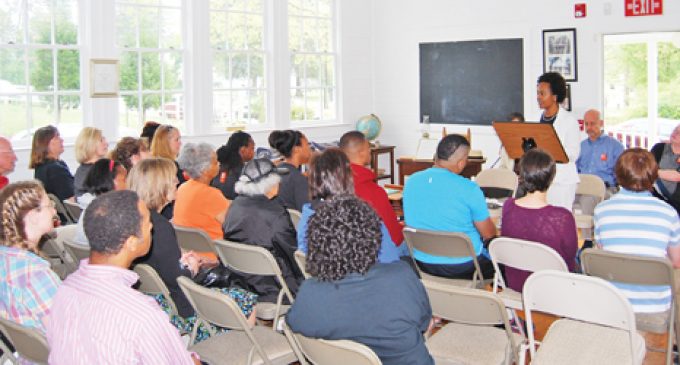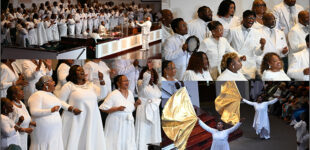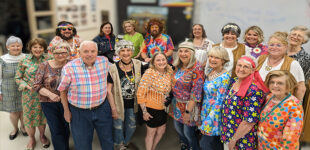Extirpating Racism

Personal stories highlight YWCA initiative
(pictured above: Gateway YWCA Board Member LaShonda Hairston speaks on the history of the Historic Oak Grove School.)
The Gateway YWCA took its annual Stand Against Racism initiative to Historic Oak Grove School on Friday, April 25.
 Located in the Oak Grove community off Sharptown Road, the one-room school educated black children from 1910-1950 and is now a historic site – complete with desks and other fixtures similar to those used in the school’s heyday. The YWCA acquired the site in 2007 and uses it for special events and educational tours.
Located in the Oak Grove community off Sharptown Road, the one-room school educated black children from 1910-1950 and is now a historic site – complete with desks and other fixtures similar to those used in the school’s heyday. The YWCA acquired the site in 2007 and uses it for special events and educational tours.
The YWCA has made attacking racism a cornerstone of its mission. To that end, YW branches across the nation regularly hold anti-racism programs. The local event drew dozens of people. They heard Mayor Pro Temp Vivian Burke recall her own personal experiences with racism. After being elected to the City Council in 1977, Burke said she used her appointment to the Public Safety Committee to improve the relationship between the Winston-Salem Police Department and the black community and to ensure that blacks were represented in the Police Department’s leadership. Her efforts did not sit well with some. She said she received many hateful and threatening phone calls.
“We cannot eliminate history, but we must be strong enough to understand and face history,” she said.
Dr. David Hughes, the former pastor of First Baptist Church on Fifth Street, reflected on his journey to understanding race relations as a protestant white man. Hughes grew up during segregation, isolated from knowing people of other races. It wasn’t until the 1960s, when he attended the recently-integrated Wake Forest University, that he met his first black friend.
But the vestiges of racism remained on campus, Hughes said. The fraternity he belonged to voted to not allow black students. Hughes said to his shame, he did not leave the fraternity because he thought discrimination was the norm. That view faded, he said, as he got to know more and more people of color.
When he headed First Baptist, its mostly white congregation began a partnership with the mostly black congregants of United Metropolitan Missionary Baptist Church. Members regularly come together for movie discussions, dinners and other social events and host an annual basketball camp for youngsters.
Though his life is filled with a diverse group of friends and colleagues, Hughes said he doesn’t believe America is yet in a “post racial” stage, pointing out that the average white family has four times the wealth of the average Hispanic family and six times the wealth of the average black family. He said people with no animosity toward minorities commonly engage in institutional racism that creates such inequalities.
“Despite astounding progress on the racial front, we still have many miles to travel before we sleep,” he said.
Hughes said some of the seeds of racism and bigotry were planted by the church, noting that slave owners turned to scripture to justify owning blacks.
He said the key to fixing racism and all of its corollary effects may be in following the example of Peter, who once had great disdain for the Gentiles. Peter’s views changed over time, and not only did he welcome Gentiles into the church, but put them in positions of leadership.
“Until or unless you share your power with those people, you are still participating in and profiting from a system that is racist,” he said.
Former Oak Grove student Violet Glenn Madison attended the program and said she could relate to much of what was said, having seen her share of bigotry over her 89 years of life.
When she was an Oak Grove student in the 1930s, she used hand-me-down books from the nearby white school, Old Town. As an adult, when she moved to Washington, D.C. to work for the federal government, she rode segregated city buses and ate her lunches in cafeterias where whites and blacks sat separated.
She participated in the historic March on Washington, but, fearing reprisals, keep it a secret from her employers. She said the nation has made progress, but the nation Dr. King described in his famous “I Have a Dream” speech at the March on Washington is still not yet a reality.
“We’ve come a far way, but we haven’t reached the peak yet,” she said.




















